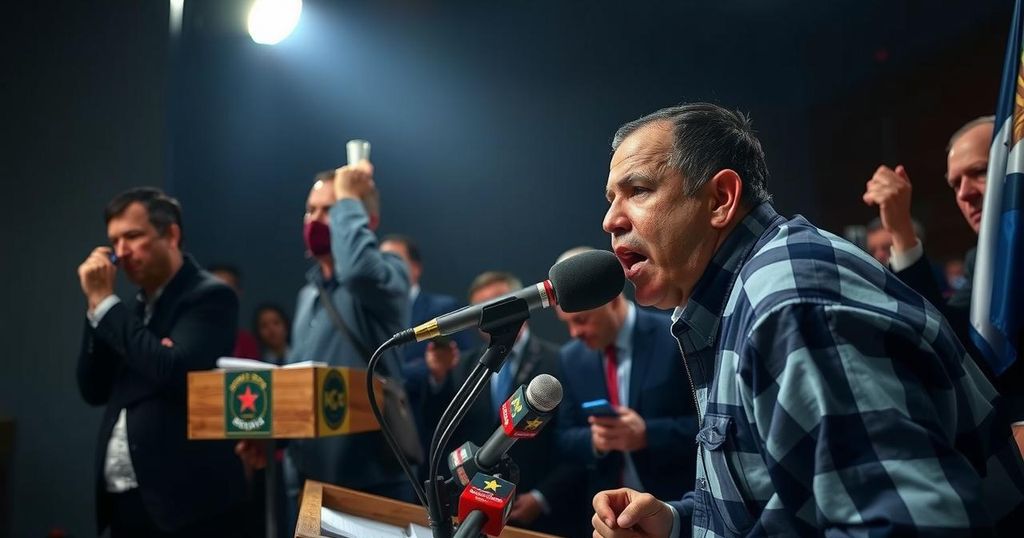Politics
ÁLVARO DELGADO, BROAD FRONT, CARIBBEAN, COLORADO PARTY, CONGRESS, DEMOCRACY, ECONOMIST INTELLIGENCE UNIT, ELECTIONS, FRENTE AMPLIO, LATIN AMERICA, LONDON, LUIS LACALLE POU, MONTEVIDEO, NATIONAL PARTY, NICOLÁS SALDÍAS, NICOLAS SALDIAS, POLITICS, PRESIDENTIAL ELECTION, SOUTH AMERICA, SOUTH AMERICAN, TRADE RELATIONS, U. S, URUGUAY, YAMANDÚ ORSI
Marcus Li
0 Comments
Uruguay’s Presidential Runoff: A Critical Crossroads for Voters
Uruguay’s presidential runoff has intensified as Álvaro Delgado of the National Party and Yamandú Orsi of the Broad Front vie for leadership following an inconclusive first round. With Delgado seeking to continue existing governance and Orsi aiming to revive progressive approaches, the election reflects critical socio-economic issues and a resilient democracy amidst voter uncertainty.
Uruguay is witnessing a heated presidential runoff as voters prepare to return to the polls this Sunday to select their next leader. The runoff pits the conservative ruling party against the left-leaning coalition, as neither faction secured a majority in October’s election. The candidates, Álvaro Delgado of the National Party and Yamandú Orsi of the Broad Front, are battling fiercely for votes amidst significant voter uncertainty. Delgado represents the incumbent National Party, which has maintained a pro-business stance and supports existing governance policies, while Orsi seeks to revive the social policies of the Broad Front, which previously governed Uruguay for 15 years.
Delgado garnered 27 percent of the initial vote, while Orsi’s coalition claimed 44 percent in the first round of October elections. However, additional support for conservative minor parties could strengthen Delgado’s position, though polls indicate a neck-and-neck race. The election has been characterized by the candidates’ relatively uninspired campaigns in contrast to the significant issues facing the nation, specifically the rise in crime, which has generated public concern and influenced voter sentiment. Analysts have indicated that there is a lack of polemic issues dividing the candidates, which reflects a stable electoral climate unlike that seen in other countries.
Delgado, 55, is attempting to perpetuate the agenda of President Luis Lacalle Pou, whose administration boasts a favorable economic outlook. His campaign slogans promote the continuation of good governance, reflecting stability in policy. On the other hand, Orsi, 57, aspires to offer a refreshingly progressive approach, proposing tax incentives for investment and agricultural advancement, although he also appears cautious not to alienate steadfast unions through radical reforms.
In conclusion, the upcoming runoff election is not merely a referendum on the past administration but also a critical juncture that could define the future socio-economic trajectory for Uruguay. As such, it illustrates the inherent strengths of Uruguay’s democratic process, as citizens engage in thoughtful deliberation regarding their leadership and direction.
This election, while normal in the context of global politics, signifies the resilience of Uruguay’s democratic values amid broader regional challenges.
In Uruguay, a runoff election is occurring as voters decide upon a new president following an inconclusive initial round. The governing conservative party and the left-leaning coalition, which dominated for the past 15 years until a 2019 shift in power, are the two primary contenders for leadership. This election draws considerable interest due to the candidates’ different visions for governance, particularly in light of Uruguay’s historical social reforms and recent challenges such as rising crime rates. The political landscape reflects a unique moment for the Uruguayan electorate, offering two distinct policy paths that could influence national well-being and international relationships, especially with regard to trade and social issues.
The presidential runoff in Uruguay represents a vital decision point for the nation as voters weigh the continuation of the current government’s policies against a potential return to social liberalism under the Broad Front. Both candidates have solidified distinct platforms yet share a commitment to addressing pressing national concerns. Ultimately, the outcome will shape Uruguay’s immediate future and may serve as a barometer of its democratic health and socio-economic direction in a region facing various challenges.
Original Source: abcnews.go.com




Post Comment